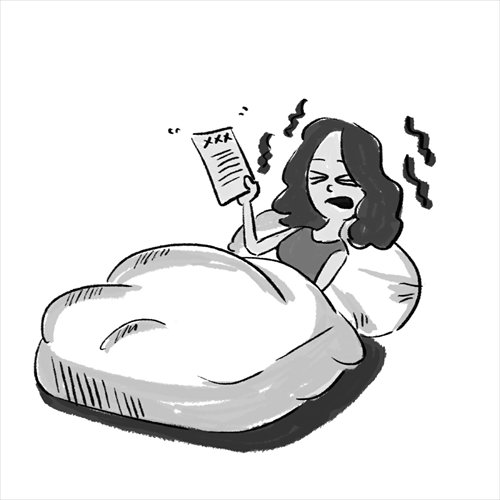Menstrual leave could cost Chinese women their career

Illustrations: Chen Xia/GT
Starting March 1, Shanghai's neighboring province Anhui will enforce legislation that allows women to take one or two days off from work when they have severe menstrual cramps. It is a generous policy for working women and a big step forward for feminists in China, but I personally doubt how many women will actually take advantage of this law.
Take a look at Shanghai, where a similar policy was introduced nearly 30 years ago in its 1987 Shanghai Temporary Regulations on the Protection of Female Employees, yet few if any women dare take leave from their jobs when suffering from period pain, with a great majority not even being aware of their rights to.
The reason: many jobs in China are evaluated and paid according to one's workload. That is to say, no matter how many days an employee comes in - or doesn't come in - to the office each month, they still have fixed responsibilities that they are required to complete.
As a professional woman in Shanghai, taking a day off of work for personal matters means that I will have to make up those lost hours as soon as I return to the office, which means I will be even busier and under more pressure than usual. So when faced with the choice, I'd prefer to put up with any physical pain my period is giving me than sit at home stressed out.
But even more worrisome to many career women is getting on the bad side of their bosses; skipping out of work and costing your company money will not do you any favors when it comes time to getting a promotion or raise.
I did not take one single day of sick leave from work last year yet was never rewarded for my attendance. Conversely, my husband often takes personal leave days yet he earns much more than me, which underscores the gender inequality that exists in China's workplaces.
Some may argue that working women are already provided very generous contracts which allow them to take months of paid maternity leave, but in fact maternity leave is one of the reasons why companies choose to hire men over women for managerial positions.
Li Ziyang, managing editor of Chinese iPencil Economic Research Institute, wrote in an article that it is a woman's choice to accept jobs with lower payment in exchange for flexible schedules. "Because women need to bear children, they choose comparatively relaxed jobs with lower payment, and this is the cost they have to pay for the purpose of reproduction."
This kind of male chauvinist philosophy is quite common across China and is the reason why women seem to be permanently stuck in disadvantaged position. In China, 44 percent of the work force is women but Chinese women's average income in 2015 was only 23,288 yuan ($3,562), 31 percent lower than men's average income, which was 33,697 yuan, as reported in a 2015 Chinese Labor Report by Sun Yat-sen University.
According to labor law experts in Shanghai, once a hospital provides proof of a woman having menstrual cramps, her employer legally must allow the woman to take leave. If not, the woman can resort to labor arbitration. But in Shanghai, where many laws and policies are not enforced, it's extremely hard for individuals to fight for their rights.
Yes, Anhui's highly publicized period pain policy is a nice gesture toward gender equality and hopefully bigger changes in the workplace will come as a result of it. And sure, women suffering from debilitating dysmenorrhea, a medically recognized pain in the pelvis that occurs during menstruation, should not be required to work.
But the "bloody" fact is that accepting paid leave whenever a woman has cramps will ultimately do more harm than good for our cause, as it weakens us at the workplace.
The opinions expressed in this article are the author's own and do not necessarily reflect the views of the Global Times.